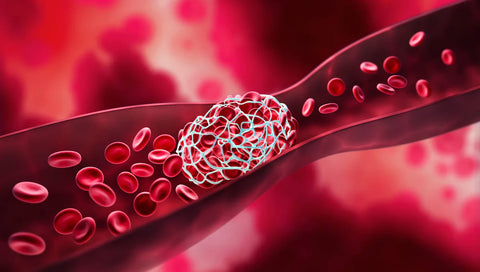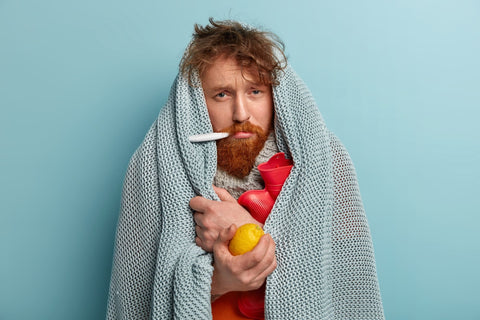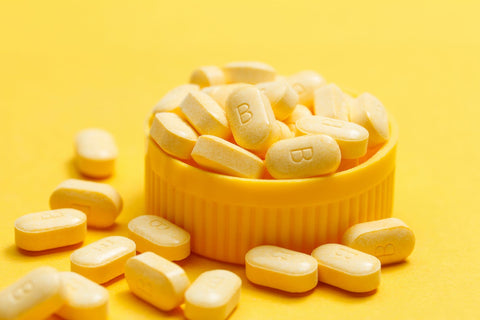Blood clot is a clump of a thick blood that has been changed from a liquid to a solid state in the vein. Deep vein thrombosis (DVT) refers to a blood clot in the vein, usually FOUND in the leg. Every year an estimated 60,000 people develop DVT in the UK (1).
Pulmonary embolism (PE) refers to a blood clot in the lung that is a medical emergency requiring an immediate medical treatment. It occurs when a DVT clot travels to the lungs blocking a blood vessel and the blood supply. It is a very serious and life-threatening condition because it can cause immediate blockage of pulmonary artery, shortness of breath and death.
Venous thromboembolism (VTE) is a general term referring to blood clots in the veins. It can indicate DVT, PE, or both at the same time.
PE has been known to be the most preventable cause of death among hospitalized patients.
Clots that form in the coronary arteries can lead to heart attacks and strokes.
It is the third leading vascular condition after heart attack and stroke.
Symptoms
Swelling, cramps and pain in the affected calf or leg, redness in the lower leg (or sometimes both legs), foot or ankle pain, shortness of breath, cough, and chest pain.
Main Causes
-
Blood clots and deep vein thrombosis may develop because of inherited genetic tendencies. In addition, many other factors, including preventable (lifestyle) causes, may be involved too.
-
Vitamin D deficiency is associated with deep vein thrombosis (2).
-
Drinking insufficient amounts of water makes blood thicker leading to impaired blood circulation.
-
Consumption of meat products was associated with 20% to a 200% increase in DVT risk, depending on the amount of meat consumed (3).
-
A diet high in milk and dairy products triggers certain mechanisms that initiate clotting in the blood vessels (4).
-
Lack of exercise increases the risk of getting a blood clot (5).
-
Overweight and obesity (5).
-
Individuals with insulin resistance and diabetes have increased risk of deep vein thrombosis.
-
Overeating causes insulin levels to go up. Insulin interferes with the mechanism which prevents blood clotting (5).
-
Sugar in the diet increases platelet stickiness and therefore increases the likelihood of having intravascular clotting (5).
-
Saturated fats (found in meat, dairy products, butter, or margarine) in experimental animal studies increased both venous and arterial blood clots (5).
-
Several studies have shown that stress (because of elevated adrenaline levels) increases the risk of platelet aggregation (5).
-
Increased oestrogen, caused by birth control pills or hormone replacement therapy, increases the risk of excessive blood clotting (5).
-
Pregnancy (5).
-
Stimulants, especially smoking, increase the risk of DVT (5)
-
Prolonged standing or sitting can increase risk for DVT (5)
-
Birth control pills (hormonal contraceptives) or hormonal replacement therapy may increase the risk of DVT.
-
Deficiency of antioxidants.
-
Nutritional deficiencies.
-
Chronic inflammation and other factors that damage a vein’s inner lining may contribute to the deep vein thrombosis.
Diet and Lifestyle Recommendations
The following natural dietary and lifestyle principles and supplementation are known to benefit deep vein thrombosis.
-
Because inactivity increases the risk of DVT, regular physical activity is one of the most important of the prevention. Exercise every day or go for a walk. In one study men who exercised four to five times a week for six months showed a 40% increase in the ability to dissolve blood clots. The exercise program included fast walking and cycling for 45 minutes five times a week. According to the same study results, the dissolving ability was lowest in the morning and highest in the evening. It explains why heart attacks often take place in the morning (6).
-
Avoid prolonged standing.
-
Cayenne pepper has been known as a powerful blood-thinner and a natural thick blood remedy (7). Its ability is due to the fact that it is high in salicylates (natural aspirin). It can be taken in capsules or with food. In addition to thinning the blood, cayenne pepper can help improve circulation and help maintain normal cholesterol and blood pressure.
-
Eat more raw vegetable salads and smoothies and fresh fruits (but don’t eat veggies and fruits at the same meal). It was found that increased intake of fresh fruits and vegetables was associated with lower risk of DVT.
-
Avoid or significantly reduce consumption of all meat products. Moderate consumption of meat was associated with 20% increase in the risk of DVT. Those with high consumption of meet had a 200% increase in DVT risk. Scientists discovered that gut bacteria reacts to a compound in eggs and meat producing a chemical known as TMAO that makes the blood more prone to clotting (3).
-
All dairy products and eggs not only promote blood clotting but increase cholesterol and make the blood thicker making us more prone to heart attacks and strokes.
-
Hydration is essential for the prevention of DVT. Three times a day drink about three glasses of filtered, or even better, distilled water between meals to keep your blood thinner. Dehydration can lead to thickening of blood which increases the risk of developing blood clots.
-
Fasting thins the blood and prevents blood clots. The potential of strict fasting to prevent formation of a thrombus has been well documented (8).
-
Ajoene, a compound released from Allicin when fresh garlic is crushed or chopped prevents blood clotting.
-
Other foods and herbs containing salicylates that may help thin the blood include ginger, turmeric, oregano, liquorice, onion, avocados, and cherries.
-
Stop smoking.
-
Lose weight if you are overweight.
-
Consume more whole oats, barley, pulses, and buckwheat.
-
Eat one tablespoon of ground flaxseed (or chia seeds) with breakfast and lunch.
-
Avoid all constipating foods such as all refined products, sugar, white flour products, white rice, desserts, and reduce intake of all foods that contain no fibre.
-
Avoid margarine, mayonnaise, fried foods, and refined oils. Studies have indicated that the more free fats you consume the greater the likelihood of blood clotting.
-
Learn to control stress.
Nutritional Supplements
-
According to some studies, Ginkgo biloba improve blood circulation, and may help to thin the blood and dissolve blood clots (9).
-
According to researchers, Curcumin, the main ingredient of Turmeric, helps prevent the formation of blood clots (10).
-
Ginger contains salicylates that are known to help thinning blood.
-
Research suggests that Bromelain can thin the blood and reduce clot formation (11).
-
Vitamin E is a popular thick blood aid and may reduce blood clotting depending on the amount taken (12). For this reason, those who are already taking blood-thinning medication, such as Coumadin (warfarin), are told to avoid taking large doses of Vitamin E.
-
Take Rutin (Vitamin P) – the most important vitamin to support the vain health. It was found that Rutin may help prevent blood clotting. Rutin inhibits secretion of certain protein which is released by platelets. By blocking the release of this protein, rutin blocked thrombosis in mice. It was discovered that it helped prevent blood clots in both arteries and veins (13).
-
V-vein is a unique supplement which contributes to the maintenance of strong and flexible veins and arteries as well as healthy blood circulation, especially to the legs and feet. It contains a combination of specific plant extracts including Bilberry, Bromelain, Ginkgo Biloba, Cayenne Pepper, Ginger, and Grape Seed. The formulation is also enriched with other beneficial nutrients such as Vitamin C and Citrus Bioflavonoids which work synergistically with plant extracts to achieve optimum benefit.
-
According to a 2007 study, B Vitamins can help to prevent DVT and pulmonary embolism by lowering homocysteine levels (14).
Warning
One of the major Coumadin (warfarin) side effects is an increased risk of bleeding. Because listed above natural substances may also carry this side effect, taking them together with anticoagulant drugs may further increase the risk of bleeding. For this reason, if you are already on anticoagulant drugs, you can take these natural blood thinners only under your doctor’s supervision as he can monitor your bleeding and clotting times.
Sources
- Watch: What is DVT and how can we stop it? - BHF
- https://www.ncbi.nlm.nih.gov/pmc/articles/PMC6920963/
- https://pubmed.ncbi.nlm.nih.gov/25962721/
- https://www.everydayhealth.com/dvt-pictures/foods-to-fight-dvt.aspx
- https://www.ncbi.nlm.nih.gov/books/NBK470215/
- https://www.ncbi.nlm.nih.gov/pmc/articles/PMC2995567/
- https://www.fullhealthsecrets.com/remedies/super-foods/cayenne-pepper/
- Muliar LA, Mishchenko VP, Loban GA, et al (1984). Effect of complete fasting on the coagulative and antioxidative properties of blood. Voprosy Pitaniya 1984; 4:20–23.
- Fibrinolytic effects of Ginkgo biloba extract - PMC (nih.gov)
- https://pubmed.ncbi.nlm.nih.gov/29052850/
- Properties and Therapeutic Application of Bromelain: A Review - PMC (nih.gov)
- https://www.medicalnewstoday.com/articles/322384#ginger
- Orally delivered rutin in lipid-based nano-formulation exerts strong antithrombotic effects by protein disulfide isomerase inhibition - PMC (nih.gov)
- https://pubmed.ncbi.nlm.nih.gov/16960155/
Related Article
Any information or product suggested on this website is not intended to diagnose, treat, cure or prevent any medical condition. Never disregard medical advice or delay in seeking it because of something you have read on this website. Consult your primary healthcare physician before using any supplements or making any changes to your regime.




